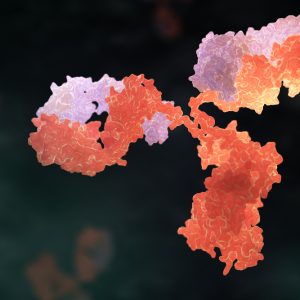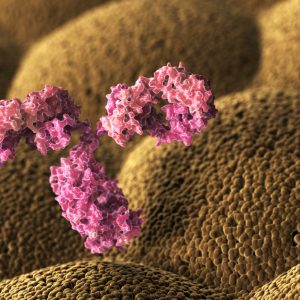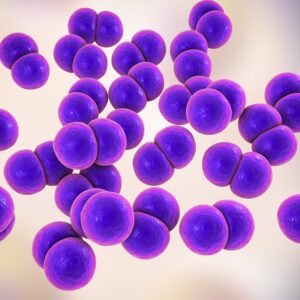GOAT ANTI-STREPTOCOCCUS GROUP B ANTIBODY
Affinity purified polyclonal antibody to S. agalactiae (Group B) bacteria (BacTrace®). Antibody was isolated from a serum pool of goats immunized with heat-killed whole cells of S. agalactiae bacteria. Each lot is tested to assure specificity and lot-to-lot consistency using in-house ELISA assay.
PRODUCT DETAILS – GOAT ANTI-STREPTOCOCCUS GROUP B ANTIBODY
- Part of the BacTrace® range of antigens and antibodies.
- Affinity purified antibody made in goat.
- Tested by ELISA techniques as applicable. This product reacts specifically with Streptococcus agalactiae (Group B). Minimal cross-reactivity may exist to other similar species.
- Product is in lyophilized form.
- Each lot is tested to assure specificity and lot-to-lot consistency using an in-house ELISA assay.
BACKGROUND
Streptococcus agalactiae (also known as group B streptococcus or GBS) is a gram-positive coccus (round bacterium) with a tendency to form chains (as reflected by the genus name Streptococcus). It is a beta-hemolytic, catalase-negative, and facultative anaerobe. It is surrounded by a bacterial capsule composed of polysaccharides (exopolysacharide). The species is subclassified into ten serotypes (Ia, Ib, II–IX) depending on the immunologic reactivity of their polysaccharide capsule. GBS is a harmless commensal bacterium being part of the human microbiota colonizing the gastrointestinal and genitourinary tract of up to 30% of healthy human adults (asymptomatic carriers). Nevertheless, GBS can cause severe invasive infections especially in newborns, the elderly, and people with compromised immune systems. S. agalactiae is also a common veterinary pathogen, because it can cause bovine mastitis (inflammation of the udder) in dairy cows and is an important source of economic loss for the industry. GBS in cows can either produce an acute febrile disease or a subacute more chronic condition. Both lead to diminishing milk production (hence its name: agalactiae meaning ‘of no milk’) (Edwards & Baker, 2010).
REFERENCES
- Edwards MS, Baker CJ (2010). “Streptococcus agalactiae (group B streptococcus)”. In Mandell GL, Bennett JE, Dolin R (eds.). Principles and practice of infectious diseases (7th. ed.). Elsevier. pp. Cap. 202.
- Keefe GP. Streptococcus agalactiae mastitis: a review. Can Vet J. 1997;38(7):429-437.
- Whiley RA, Hardie JM (2009). Genus I. Streptococcus Rosenbach 1884. Bergey’s Manual of Systematic Bacteriology: Vol 3: The Firmicutes (2nd ed.). Springer. pp. 655–711.




